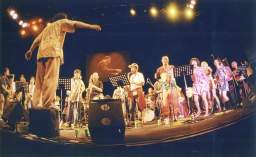
Shibusashirazu Orchestra
Japonsko
Plnokrevná hudba z Japonska, nejžhavější špičkový jazz z Dálného východu.
Orchestr se šestadvaceti muzikanty shromážděnými na scéně předvádí explozivní
vystoupení kombinované s tradičním divadlem a tancem butó. Tyto prvky jsou pro
orchestr charakteristické. Příběh Shibusashirazu Orchestra začal v roce 1989,
kdy se pár hudebníků setkalo na divadelním představení v Tokiu. Rozhodli se, že
spolu něco vytvoří. Nápad byl uskutečněn v roce 1992 a Shibusashirazu se poprvé
ocitl na scéně na tokijském festivalu "Tsukuba". Další spolupráce přinesla ovoce
v podobě dvou CD, Shibusamichi a Dettaramen. Orchestr hrál po celém Japonsku
a spolupracoval s Furen Dance Ensemble. Přilákal pozornost na undergroundových
sessions a pravidelně hrál na Yokohama Jazz Promenade. Soubor vydal také živé
album Something Difference a vystoupil na Tokijském jazzovém festivalu. Během
letošního evropského turné se Shibusashirazu Orchestra zúčastní na renomovaném
Moers Jazz Festivalu.
Butoh dance je typický současný japonský styl tance. Byl přijat s nadšením
po celém světě. O stvoření tohoto nového tanečního stylu se zasloužil Tatsumi
Hijikata (1928-1986) na konci padesátých let. Hijikata v mládí studoval balet
a moderní tanec a uvědomil si přitom, že Japonci mají kratší ruce a nohy než
lidé ze Západu. A jelikož pocházel z venkova, pamatoval si, jak japonští
zemědělci odedávna při práci na rýžových polích hýbali kyčlemi a pomalu se
pohybovali, aniž přitom vyskočili. Toto pozorování posloužilo Hijikatovi jako
výchozí bod při tvoření tance butoh.
Publikum bylo tímto přísným a avantgardním tancem překvapeno. Mnoho
talentovaných mladých lidí přicházelo za Hijikatou aby se mu naučili. Také
slavní umělci všech žánrů se s Hijikatou seznamovali, mezi nimi spisovatel Yukio
Mishima, který se stal jedním z jeho nejlepších přátel. Hijikatovi studenti se
pak stávali sami originálními tanečníky a zakládali vlastní skupiny tance butoh.
Dnes je takových skupin v Japonsku přes dvacet. Na začátku osmdesátých let byly
tři z těchto skupin pozvány na festival dramatického umění v Mnichově, kde byli
nadšeně oslavováni. Od té chvíle se vydal tanec butoh na triumfální cestu
po celém světě. Někteří kritici dokonce tvrdí, že butoh je nejvyšší dramatické
umění dvacátého století.
Shibusashirazu Orchestra
Japan
Full-steam-ahead music from Japan, the hottest summit of Far East Jazz. With
Shibusashirazu, twenty-six musicians gather on stage for an explosive
performance which combines forms of traditional theatre and Butoh dance as
significant elements of the show. The story of the Shibusashirazu Orchestra
began in 1989, when a couple of musicians met for a theatre performance in Tokyo
deciding that they wanted to get something started together. Their idea ripened
and in 1992, Shibusashirazu performed on stage for the first time, at a festival
in the Tokyo underworld "Tsukuba". The seeds bore fruit with the realease of two
CDs, Shibusamichi and Dettaramen. The group toured Japan and co-operated with
the Furen Dance Ensemble. It attracted attention at underground session and
regularly played the Yokohama Jazz Promenade. The ensemble stayed together,
releasing the live CD Something Difference and played the Tokyo Jazz Festival.
Butoh is a typical contemporary Japanese dance style which has been received
with enthusiasm all over the globe. It was Tatsumi Hijikata (1928-1986) who, at
the end of the 50's created this new dance style. Having studied ballet and
Modern Dance as a young man, Hijikata found that the arms and legs of Japanese
people were shorter than those of Westerners. And being of peasant origin he
remembered that, since old times, Japanese farmers had been working in the rice
fields bending their hips and moving slowly without ever jumping. It was this
observation that served Hijikata as a starting point in the creation of the
Butoh dance.
The audience was surprised at this stern and avant-garde dance style. Many
talented young people now came to Hijikata in order to learn this dance. Also
famous artists from all genres tried and established contact with Hijikata,
among them the writer Yukio Mishima, who became one of his best friends.
Hijikata's students, when having become original dancers of their own, founded
their own Butoh dance group, today, there are more than twenty such groups all
over Japan. At the beginning of the 80's, three of these Butoh groups were they
were celebrated enthusiastically. Since then, the Butoh dance has been pursuing
its triumphal march throughout the world. Some critics even go as far as calling
Butoh the highest of all dramatic arts of the 20th century.
